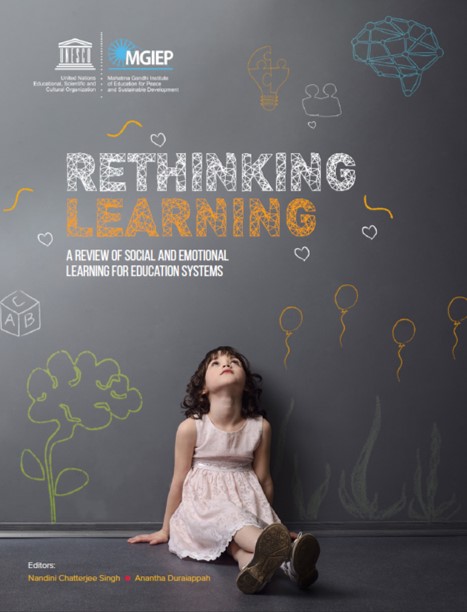UNESCO MGIEP urges Member States to mainstream Social and Emotional Learning in education systems
New Delhi: In commemoration of the Nelson Mandela Day, the UNESCO Mahatma Gandhi Institute of Education for Peace and Sustainable Development (MGIEP) today presented an extensive, peer-reviewed guide on Social and Emotional learning (SEL), entitled “Rethinking Learning: A Review of Social and Emotional Learning for Education Systems”.
The report uses the latest research and evidence from the sciences of learning and calls upon governments to mainstream Social and Emotional Learning within education systems. The Institute also announced the launch of The Global Collective for SEL and Digital Learning with four Governments and over 20 SEL based organisations to support the integration of SEL and the use of digital learning to scale up the process of mainstreaming SEL in education systems. The Collective was formally launched by the Hon’ble Minister of Education of the Maldives Dr. Aishath Ali and the Hon’ble Minister of Education, Sports & Youth Affairs of Sri Lanka Mr. Dullas Alahapperuma.
The Rethinking Learning report was released during a virtual panel discussion of six children from India, Afghanistan, Bangladesh, Bhutan, South Africa and Japan. The discussion was moderated by Dr. Nandini Chatterjee Singh, Cognitive Neuroscientist and Senior Programme Officer, UNESCO MGIEP. The common sentiment, expressed by the children, aged between 12 and 14, was the difficulty they faced in dealing with the pandemic while not meeting friends, peers, and teachers. The children also stressed upon the importance of compassion in relationships and the challenges they faced while being in digital learning environments as opposed to being in physical school environments.
Following the panel discussion, the children panelists officially launched the Rethinking Learning guide, after which Dr. Anantha Duraiappah, Director, UNESCO MGIEP, elaborated on the relevance of SEL and discussed the findings of the report in light of the current COVID-19 pandemic. He stressed that “Social Emotional Learning should be regarded not only as a remedial or preventive measure for those who are particularly vulnerable to stress but also as a long-term solution to quality education. There is a confluence of research from multiple studies showing that students who participate in SEL programmes, relative to students who do not, demonstrate significantly improved social-emotional competencies, attitudes, and behavioural adjustment. In addition, research indicates that students who participated in SEL programmes also outperformed those students who did not participate in such programmes, on indices of academic achievement by 11-percentile points.”
He further added “mainstreaming SEL into education can contribute to achieving the Sustainable Development Goal (SDG) 4 by allowing all learners to be better prepared to learn (SDG Target 4.1-4.6) and to help develop empathy, compassion and a sense of solidarity with humanity (Target 4.7).”
This report reviews the latest research on SEL, its impact on student health and school climate and its transformative role in building happier classrooms. It seeks to inform and impress upon policy makers and educationists on the urgent need to mainstream social and emotional learning in education systems. The report is authored by over twenty experts from eight countries such as Dr. Clifford Saron (Research Scientist, the Center for Mind and Brain and the MIND Institute, University of California) and Dr. Kimberly Schonert-Reichl, Applied Developmental Psychologist and Professor, Faculty of Education, University of British Columbia. Each chapter is supported by experts in their respective fields.
This guide on Social and Emotional learning comes at an opportune time when the world is grappling with the COVID-19 pandemic, with over 1.6 billion learners affected because of school closures in over 195 countries as of beginning of April 2020 at the peak of the pandemic[1]. A key finding from the report calls upon the Member States of the United Nations (UN) to increase their education budgets to include training for teachers in SEL and the overall education system. Preliminary results show an impressive return on investment (ROI) of about 7 to 10. Furthermore, preliminary results from the report show that the productivity loss for not spending on SEL interventions is about 29% of Gross National Income. These are indeed large numbers that need further exploration and studies but offer some strong opportunities for further improving economies and societies at large. It is also important that policymakers take a strengths-based approach to SEL assessment and monitoring, one in which students’ social and emotional strengths and capacities are at the fore and to not adopt standardised student learning assessments. This will pave the way for the promotion of students’ positive development and will help prevent problems.
To give legs to the recommendations, The Global Collective for SEL and Digital Learning was officially launched, and the mission of the Group gains significance in the face of the COVID-19 crisis. The newly launched multi-stakeholder Global Collective will pool ideas, experience, and knowledge around SEL and the wise, effective and ethical use of digital technology in education, to inform education policy and practice and achieve inclusive and equitable quality education.

